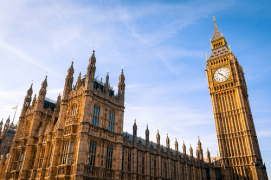Archived article
Please note that tax, investment, pension and ISA rules can change and the information and any views contained in this article may now be inaccurate.

In the end Boris Johnson should - just - outlast Theresa May’s stint as Prime Minister, but financial markets are now wondering who will come next and what policies they will bring with them.
The FTSE All-Share is up, and the pound is making minor gains against the dollar and euro as investors consider who the next PM will be and hope for greater domestic political stability. However, history suggests it takes more than a new incumbent in 10 Downing Street to really get the stock market going.
Prime Minister |
Tenure |
Party |
Days in office |
|---|---|---|---|
Margaret Thatcher |
1979-1990 |
Conservative |
4,226 |
Tony Blair |
1997-2007 |
Labour |
3,708 |
John Major |
1990-1997 |
Conservative |
2,345 |
David Cameron |
2010-2016 |
Conservative |
2,258 |
Harold Wilson |
1964-1970 |
Labour |
2,071 |
Ted Heath |
1970-1974 |
Conservative |
1,350 |
James Callaghan |
1976-1979 |
Conservative |
1,122 |
Theresa May |
2016-2019 |
Conservative |
1,105 |
Boris Johnson* |
2019-2022 |
Conservative |
1,079* |
Gordon Brown |
2007-2010 |
Labour |
1,044 |
Harold Wilson |
1974-1976 |
Labour |
766 |
Source: www.britannica.com. * To 7 July 2022
Since the inception of the FTSE All-Share in 1964, five Prime Ministers have taken office mid-way through a Parliament, following the departure of their predecessor – James Callaghan and Gordon Brown for Labour, in 1976 and 2007, and John Major, Theresa May and Boris Johnson for the Conservatives in 1990, 2016 and 2019 respectively.
On average, the FTSE All-Share made no progress at all during their first year in the hot-seat, rising on average by 1.9% over the first three months of the new PM’s tenure, gaining 1.5% over six months and coming in slightly down over a year.
|
FTSE All-Share performance: after arrival of new, mid-term Prime Minister |
|||
|---|---|---|---|---|
|
3 months |
6 months |
12 months |
Term |
James Callaghan, Labour, 1976-79 |
(3.3%) |
(18.6%) |
2.4% |
71.8% |
John Major, Conservative, 1990-97 |
11.5% |
15.9% |
13.9% |
107.7% |
Gordon Brown, Labour, 2007-10 |
(1.1%) |
(1.8%) |
(16.4%) |
(18.2%) |
Theresa May, Conservative, 2016-19 |
4.3% |
9.3% |
11.8% |
14.1% |
Boris Johnson, 2019-2022 |
(1.6%) |
2.8% |
(17.2%) |
(4.6%) |
|
|
|
|
|
Average |
1.9% |
1.5% |
(1.1%) |
34.2% |
Source: Refinitiv data
This makes it clear that while political stability is welcome, there are many other factors at work when it comes to how the stock market performs.
Looking at the course of their leadership, there is then a wide range of stock market returns during the tenures of those five mid-term Prime Ministers.
The FTSE All-Share galloped higher under John Major, as the UK came out of recession and the economy got a huge boost from 1992’s devaluation of the pound and embarrassing ejection from the Exchange Rate Mechanism. It also gained under James Callaghan, as the All-Share continued to advance from its multi-year low of early 1974 and investors looked for some kind of protection from inflation, which continued to spiral, thanks to the oil price shocks of 1973 and 1979 and such questionable policies as windfall taxes, demand subsidies and price controls.
In contrast the index did relatively little under Theresa May’s stewardship, as the nation wrestled with the implications of 2016’s Brexit vote and share prices drew succour from weakness in the pound. UK shares actually lost ground under both Boris Johnson and Gordon Brown. Brexit uncertainty, covid-19, the Russian invasion of Ukraine and a resurgence of inflation hardly helped Johnson’s cause - nor did his occasionally fractious relationship with big business. Meanwhile Gordon Brown found the Great Financial Crisis dropping into his lap, to thoroughly confound his prior statement that the days of boom and bust were at an end.
The economy’s performance will help to shape stock market performance, but Government and central bank policy and global events can have a say, too.
And ultimately it is corporate profits and cash flows - and the price (or valuation) investors are prepared to pay to access them - that really dictate how the FTSE All Share will perform.
With a dividend yield of around 4.2%, the FTSE All-Share can be seen as a 23.8-year duration bond (as this is how long it would take investors to get their money back, assuming no change in dividends or share prices).
This shows exactly why shares should be treated as a (very) long-term investment and why the role of short-term politics should not be over-emphasised, as very few Prime Ministers have lasted for much more than one full term of office, at least since the inception of the FTSE All-Share in 1964, and their tenures, if anything, seem to be getting shorter – and shorter.
These articles are for information purposes only and are not a personal recommendation or advice.
Related content
- Tue, 30/01/2024 - 15:38
- Thu, 11/01/2024 - 14:26
- Thu, 04/01/2024 - 15:13
- Fri, 17/11/2023 - 08:59
- Thu, 09/11/2023 - 17:09

